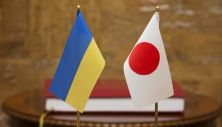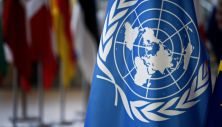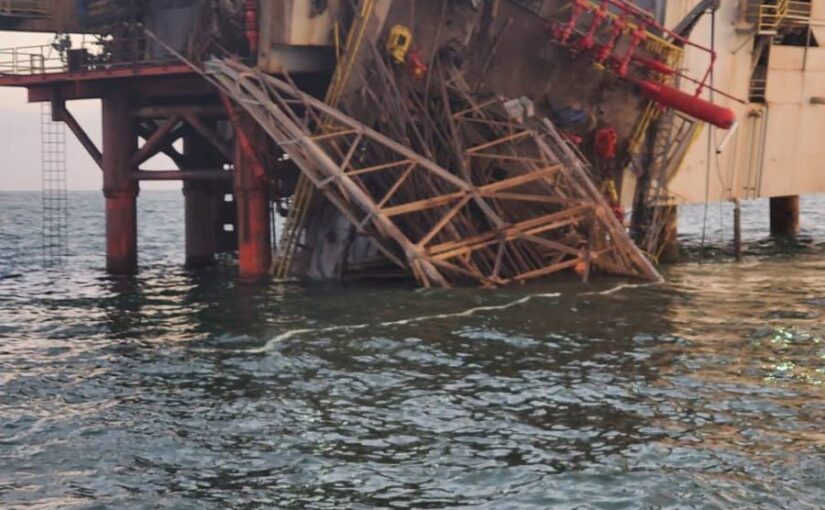Ukraine and Japan have established a platform for introducing technologies for the reconstruction and recovery of Ukrainian...
Vous n'êtes pas connecté
- English
- Français
- عربي
- Español
- Deutsch
- Português
- русский язык
- Català
- Italiano
- Nederlands, Vlaams
- Norsk
- فارسی
- বাংলা
- اردو
- Azərbaycan dili
- Bahasa Indonesia
- Հայերեն
- Ελληνικά
- Bosanski jezik
- українська мова
- Íslenska
- Türkmen, Түркмен
- Türkçe
- Shqip
- Eesti keel
- magyar
- Қазақ тілі
- Kalaallisut ; kalaallit oqaasii
- Lietuvių kalba
- Latviešu valoda
- македонски јазик
- Монгол
- Bahasa Melayu ; بهاس ملايو
- ဗမာစာ
- Slovenščina
- тоҷикӣ ; toğikī ; تاجیکی
- ไทย
- O'zbek ; Ўзбек ; أۇزبېك
- Tiếng Việt
- ភាសាខ្មែរ
- རྫོང་ཁ
- Soomaaliga ; af Soomaali
Rubriques :
 Maroc - EURASIAREVIEW.COM - A la une - 24/Jan 01:33
Maroc - EURASIAREVIEW.COM - A la une - 24/Jan 01:33
Rebuilding Syria’s Infrastructure A Critical Priority – Analysis
Rebuilding Syria’s infrastructure is a monumental task that must be prioritized by the new government following the fall of the Assad regime. After nearly 14 years of protracted conflict, the country faces an overwhelming challenge in restoring its basic services, industries and economy. The devastation wreaked by war has left much of Syria's infrastructure in ruins, with cities like Aleppo and Homs bearing many scars. Roads, bridges, hospitals, schools and power plants have been destroyed, leaving millions of Syrians without access to essential services. Understanding how Syria came to be in this dire state underscores the urgency of focusing on reconstruction. The conflict, which began in 2011, was a multifaceted war involving numerous factions, foreign interventions and devastating humanitarian consequences. The relentless fighting, airstrikes and sieges obliterated industrial zones, agricultural land and public infrastructure. Urban centers, once vibrant hubs of economic activity, have been reduced to rubble. Nearly half of Syria's population has been displaced, either internally or externally, creating a refugee crisis that has strained neighboring countries and Europe. The collapse of infrastructure has compounded the suffering, with limited access to clean water, electricity and healthcare further exacerbating the dire living conditions. Prioritizing the reconstruction of infrastructure is essential for Syria’s recovery. It will not only address the immediate needs of the population but also serve as a foundation for economic revival and social stability. Rebuilding transport networks, for instance, will enable the movement of goods and people, revitalizing trade and commerce. Restoring energy facilities will provide electricity to households and businesses, jumpstarting production and creating jobs. Reviving water and sanitation systems will improve public health, reducing the spread of diseases and enabling communities to rebuild their lives. Beyond the practical benefits, infrastructure reconstruction holds symbolic value. It signifies a commitment to rebuilding the nation and restoring normality after years of devastation. It also fosters a sense of unity and shared purpose, as communities come together to rebuild their towns and cities. For a nation emerging from conflict, such collective efforts can contribute to healing and reconciliation, laying the groundwork for a more cohesive society. The issue of sanctions, however, remains a significant obstacle to Syria’s recovery. Many Arab countries have urged the West to lift the sanctions on Damascus, recognizing that these restrictions hinder reconstruction efforts. While the sanctions were imposed to pressure the Assad regime, they also impede the delivery of humanitarian aid and the rebuilding of critical infrastructure. Sanctions limit access to financial resources, restrict trade and deter foreign investment, all of which are essential for recovery. Lifting or easing the sanctions would enable the new government to access international funding, procure construction materials and attract foreign expertise. Rebuilding Syria’s infrastructure also requires a multipronged approach from the new leadership. Political stability is a prerequisite for attracting investment and securing international support. The government must demonstrate a commitment to democratic principles, human rights and transparent governance. This will not only gain the trust of the Syrian people but also encourage the international community to engage constructively in the country’s recovery. Public-private partnerships can play a crucial role in accelerating reconstruction by involving private enterprises in projects such as energy production, transport and housing. This collaboration can harness additional resources and expertise, ensuring efficient rebuilding efforts. Syria also has an opportunity to invest in renewable energy sources like solar and wind power. With its traditional energy infrastructure heavily damaged, renewable energy projects can address electricity shortages while positioning Syria for a more sustainable and energy-independent future. Countries like Saudi Arabia and the UAE, with their expertise in renewable energy, could provide valuable support in this area. Combating corruption is another critical aspect of reconstruction. Corruption has historically plagued Syria and rebuilding efforts must include strict measures to ensure transparency and accountability. Reconstruction funds must be utilized effectively, reaching intended projects without mismanagement or diversion. Capacity-building is equally important, as rebuilding infrastructure requires a skilled workforce. Investments in education and vocational training can equip Syrians with the necessary skills for construction, engineering and technology-related fields. This not only supports reconstruction efforts but also reduces unemployment and helps reintegrate displaced persons and former combatants into the workforce. Rebuilding Syria’s infrastructure will have transformative benefits for the nation. It will reestablish Syria as a functional state capable of engaging meaningfully in regional and global affairs. A strong infrastructure supports internal development and would position Syria as a potential trade hub, given its strategic location at the crossroads of the Middle East, Europe and Asia. Improved transport networks can facilitate regional trade and foster economic interdependence with neighboring countries, creating mutual benefits that contribute to long-term peace and stability. The reconstruction of housing, schools and healthcare facilities will also help address the needs of millions of displaced Syrians, both internally and externally. Providing safe housing and essential services will encourage refugees to return, aiding the country’s demographic recovery and workforce replenishment. International organizations such as the UN High Commissioner for Refugees have expressed a willingness to collaborate with Syria’s new leadership to support the safe repatriation and reintegration of refugees. The advocacy of Arab nations for lifting sanctions reflects a growing regional consensus on the need to assist Syria’s recovery. Countries like Saudi Arabia, the UAE and Jordan have not only called for the easing of Western-imposed restrictions but have also shown an interest in participating in reconstruction efforts. In conclusion, rebuilding Syria’s infrastructure is not just a logistical challenge, it is a moral and strategic imperative that will define the nation’s future. Prioritizing infrastructure reconstruction will be critical for economic revitalization, social stability and national unity. However, this task requires significant international cooperation, the lifting of sanctions and the establishment of a stable and transparent political environment. The new Syrian government has an opportunity to demonstrate its commitment to the country’s recovery by enacting reforms that attract investment, ensuring accountability in reconstruction efforts and fostering partnerships with regional and global stakeholders. For the international community, supporting Syria’s rebuilding process is not just an act of humanitarian goodwill but also an investment in regional and global stability. As the new leadership embarks on this monumental task, the rebuilding of Syria’s infrastructure will serve as a cornerstone of its transition from a war-torn nation to a thriving, resilient state.
Articles similaires
Saudi Arabia’s FM Announces Landmark Visit To Lebanon
By Daniel Fountain Prince Faisal bin Farhan said on Tuesday in Davos he would visit Lebanon later this week, the first such trip by a Saudi...
Russia welcomes to help rebuild Syria
Russia is welcome to assist the Syrian people in rebuilding their country as long as Syria's national interests are protected, Sheikh Hikmat...
Russia-Iran Treaty Signifies A ‘Breakthrough’ In Ties – OpEd
Russia and Iran, as two immediate neighbours and great powers with a glorious history, had a difficult, chequered relationship through centuries. It...
Aoun Urges UNHCR Chief To Organize Return Of Syrian Refugees
By Najia Houssari Lebanese President Joseph Aoun called on the UNHCR’s commissioner, Filippo Grandi, to “start organizing return convoys for...
Iraq Is In For A Rough 2025 – Analysis
Iraq is a developing democracy, but its location — between Iran, Saudi Arabia, Turkey and Syria — means that it always faces pressure from...
Syria foreign minister says removing sanctions ‘key’ to restoring stability | News
Asaad al-Shaibani also says that Syria’s new constitution will represent all of the country’s communities. Syria’s new foreign minister has said...
The United Nations Development Programme (UNDP) has received $20.79 million from the Republic of Korea to support early recovery and local development in Ukraine
The United Nations Development Programme (UNDP) has received $20.79 million from the Republic of Korea to support early recovery and local...
Heritage continues supporting Well Services to retrieve rig worker’s body
Heritage Petroleum is continuing to support Well Services Petroleum Company Ltd in its salvage and recovery operations surrounding the partial...
Six EU nations call for temporary Syria sanctions relief
(Reuters) - Six member states of the European Union have called for the bloc to temporarily suspend sanctions on Syria in areas such as transport,...
Les derniers communiqués
-
Adobe Brings Conversational AI to Trillions of PDFs with the New AI Assistant in Reader and Acrobat
Adobe - 21/02/2024
-
Laura Frigenti takes the Helm as Chief Executive Officer of the Global Partnership for Education
Global Partnership for Education - 05/12/2022





